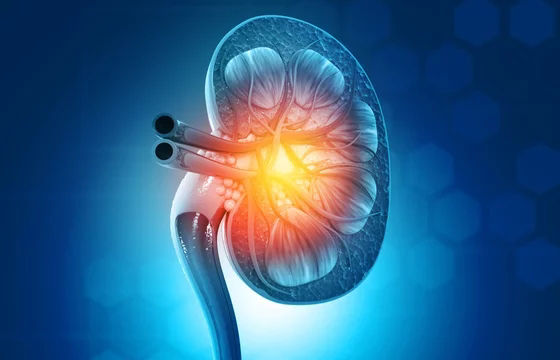How Cosmic Radiation Damages the Kidney
During the long missions to Mars, astronauts are exposed to these high-energy particles called Galactic Cosmic Radiation (GCR), which are usually absorbed by Earth's magnetic field. These particles can significantly impact organs and DNA, especially the kidneys, which are more vulnerable to radiation.
Unfortunately, the kidneys show late signs of exposure to these radiation particles, which leads to failure when attempts are made to save them. Researchers have found that both mice and human kidneys undergo "remodeling" under space conditions, affecting how they process salts and increasing the likelihood of kidney stones. The combined effect of microgravity and radiation plays a crucial role in the kidney failure of astronauts.
Why Are the Kidneys Particularly Vulnerable to Radiation?
Kidneys are particularly vulnerable because of their highly sensitive nature to radiation. Radiation increases oxidative stress in the body, producing damaging molecules like isoprostanes and 8-iso-deoxyguanosine, which further harm kidney cells. During long stays in a microgravity environment, fluid in the body redistributes and alters kidney function, which can cause kidney stones.
The lack of gravity affects how fluids and minerals are processed in the kidneys, making stone formation more likely. Microgravity can also cause changes in the structure of the kidneys, impairing their ability to filter blood and remove waste efficiently. During space missions, changes in urine composition and a decrease in urine volume create perfect conditions for nephrolithiasis (kidney stones).
In a nutshell, the combined effects of microgravity and radiation cause permanent damage to the kidneys, which is unfortunately irreversible.
Space Suits Limitations
Despite their $122 million price tag, NASA's space suits still cannot fully protect astronauts from harmful radiation. There are several reasons for this:
Cosmic Radiation: Space suits provide some protection against radiation, but they are not capable of completely shielding astronauts from cosmic rays and galactic radiation. The kidneys are particularly sensitive to radiation, which can result in chronic kidney disease or end-stage kidney disease.
Microgravity: Space suits do not address the effects of microgravity on the body. In a microgravity environment, bodily fluids redistribute, affecting kidney function and increasing the risk of kidney stones. This lack of gravity changes how fluids and minerals are processed in the kidneys, making stone formation more likely.
Oxidative Stress: Space travel increases oxidative stress in the body, leading to the production of harmful molecules that can damage kidney cells. Space suits cannot prevent these internal biochemical changes, which are exacerbated by the unique environment of space.
Limited Protection Duration: Even the most advanced space suits are designed for limited use and cannot provide the continuous, long-term protection needed for missions that span several months or years, such as a round trip to Mars. Prolonged exposure to space conditions without adequate protection increases the risk of kidney damage.
Solutions
To counter these issues, space agencies are actively addressing the risk of kidney damage during Mars missions through several strategies:
Radiation Monitoring: Continuous tracking of radiation exposure to assess risks.
Technical Solutions: Improved spacecraft shielding materials.
Pharmaceutical Interventions: Developing drugs to mitigate radiation effects.
Behavioral Guidelines:Educating astronauts on minimizing exposure.
Mission Duration Optimization: Shortening missions to limit radiation exposure.
Biological Research: Studying adaptations for radiation resistance.
Conclusion
The study by University College London underscores the severe risks that Galactic Cosmic Radiation and microgravity pose to astronaut kidney health during Mars missions. These conditions can cause irreversible kidney damage, highlighting the urgent need for improved protective measures. Space agencies are exploring various strategies, including enhanced radiation monitoring, advanced shielding materials, pharmaceutical interventions, and mission duration optimization. While these solutions offer hope, significant challenges remain in ensuring the safety and health of astronauts on long-duration space missions. The pursuit of these advancements is crucial as humanity continues its quest to explore the Red Planet.















0 Comments